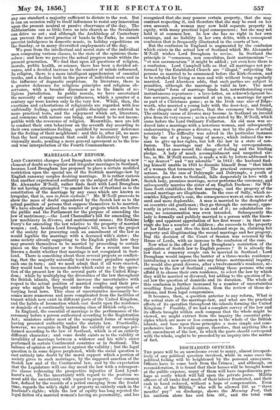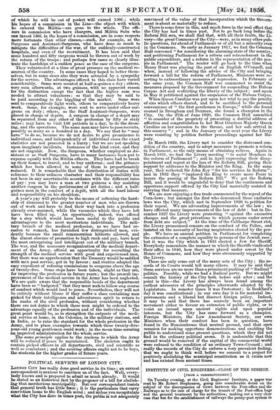DISCHARGED OFFICERS.
THE peace will be an unwelcome event to many, almost irrespect- ively of any political question involved, while in some cases the political feeling will be heightened by the personal annoyance. Officers have to come back from the Crimea ; and although, on reconsideration, it is found that their horses will be brought home at the public expense, many of them will have impedimenta per- haps as costly which will fall upon the private purse. Militia officers of all ranks find much of their labour frustrated, and their cash in hand reduced, without a hope of compensation. Even " A Sub. of the Militia," who will be allowed 251. as " three months' pay" on discharge, shows the Morning Post, that his uniform alone has cost him 50/., and the total sum of which he will be out of pocket will exceed 1501. ; while his hopes of a commission in the Line—the object with which he entered the Militia—are gone to the winds. The offi- oers in commission who have chargers, and Militia Subs who Can invest 1601. in the hopes of a commission, are in some respects more fortunate than other classes,—such, for example, as the Surgeons and Assistant-Surgeons, who have done so much to =tip" te the difficulties of the war, of the suddenly-constructed hospitals, and even of the recruitment. It has been said that some hundred and fifty surgeons would be thrown out of work by the return of the troops ; and perhaps few cases so clearly illus- trate the hardships of a sudden peace as the case of the surgeons.
They volunteered at a time of great pressure on the medical re- sources of the country. In some cases they hoped to better them- , selvee, but in some cases also they were actuated by a sympathy for the service. The advantages offered to this class have varied considerably. Some were secured at half-a-guinea a day ; others, very soon afterwards, at two guineas, with no apparent reason for the distinction except the fact that the higher sum was needed to attract volunteers ; so that they may be said to be paid according to the higgling of the market. Some were sent to comparatively light work, others to comparatively heavy work. Some, for example, were sent to serve under other tair- geons on duty ; others, as the Staff Assistant-Surgeons, were placed in charge of depots. A surgeon in charge of a depot may be separated from any other of the profession by fifty or sixty miles ; may have to visit 160 patients in a day, to do the dress- ing, and the operations. The same man may hive to pass recruits, possibly as many as a hundred in a day. We say that he "may have " to do so, because we do not desire to give prominence to individual cases, and independently of individual cases the exact statistics are not procured in a hurry; but we are not speaking upon imaginary incidents. Instances of the kind exist, and they are not singular. Now, the Surgeons, whether employed as As- . Instant or as Staff Surgeons, have in many instances been put to expense equally with the Militia officers. They have had to break ap their homes, to travel, and to buy uniforms ; and the pittance which has been allowed to some of them is proportionately reduced. It is remarkable that the distribution of duties with reference to their arduous character and their responsibility has
not beenbey en ,ins Fans: ascertproainababblylebaeccoredanm accordance wiothf softening ndiffin getrhenet rates of pay : you may have a man a two guineas a day assisting half- guinea man in the conduct of a dep6t, with all the hard labour smother surgeon in the performiume_ of set duties ; and a holl- and responsibility on his shoulde.g, ship of dismissal to the greater number of men who are thrown out of work and have to find their way back into a profession already over-manned, while the vacancies which they have left have been filled up. An opportunity, indeed, was offered for a step which would have been useful to the public and advantageous to the most meritorious individuals. The mili- tary branch of the medical profession, as we have had oc- casion to remark, has furnished few distinguished men, evi- .dently because the small remuneration hitherto allowed, and the almost absence of promotion to high rank and pay, have ke the most enterprising and intelligent out of the military The war, and the necessary reorganization of the medical depart- ment of the Army, offered an opportunity for recruiting the strength of the medical service with good and experienced men. But there was an apprehension that the Treasury would be saddled with men past service, got in by favour ; and routine adopted the easy expedient of refusing commissions to surgeons above the age of twenty-five. Some steps have been taken, slight as they are, for improving the profession in future years ; but the present im- p_ovement of the medical service in the Army has been neglected. We are quite aware that the responsible heads of the department have been so " badgered" that they must seek to follow any course of conduct which would lead to peace. Nevertheless, they will not be entirely without blame if they suffer a class containing men picked for their intelligence and adventurous spirit to return to the ranks of the civil profession, without considering whether there are not duties to which those men might be ordered to the advantage equally of the profession and of the individuals. The great point would be, so to strengthen the outposts of the medi- cal service at home, in the Colonies, in the military stations, and in India, as to raise the standard for the whole profession in the Army, and to place examples towards which those twenty-five- year-old yow. gentlemen could work ; in the mean time securing an improved minisWation for the whole service. The same principle applies to the nucleus to which the Army will be reduced if peace be maintained. The skeleton ought to contain picked officers in all departments, civil and scientific as well as combatant ; and the existing officers ought not to be boys, the students for the higher grades of future years.



































 Previous page
Previous page